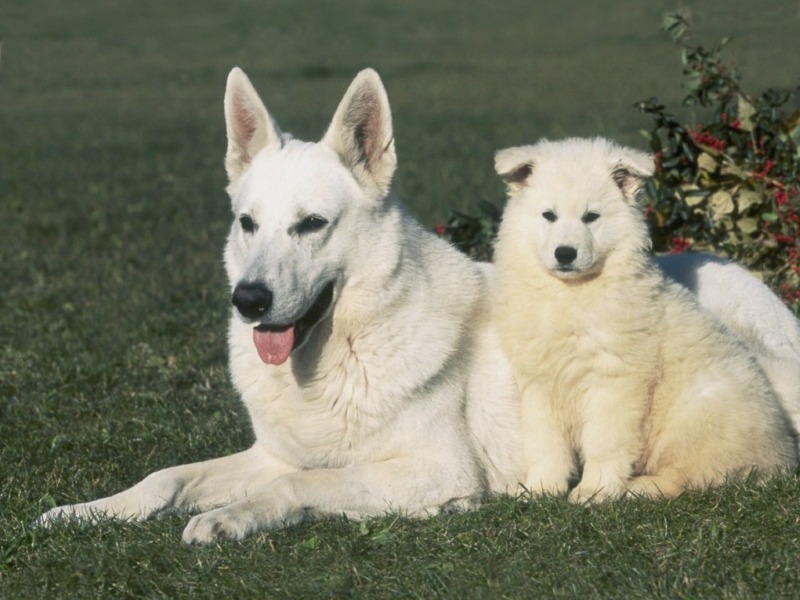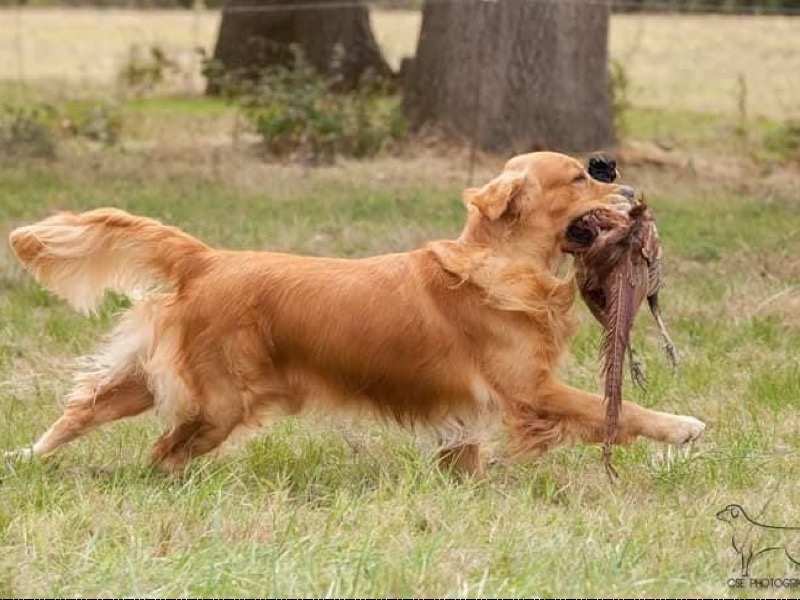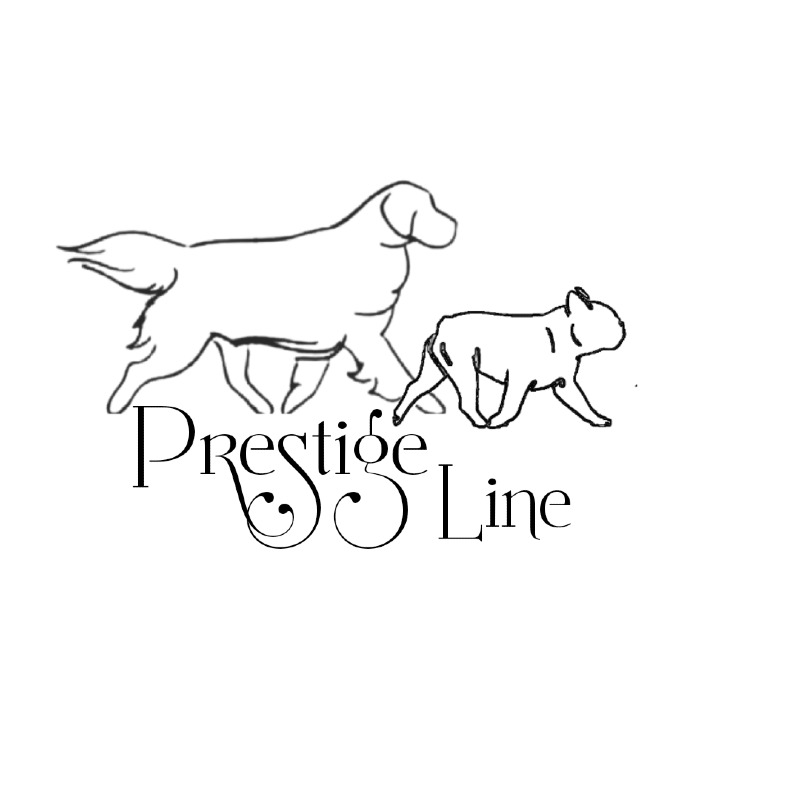Golden retriever
Welcome to our page dedicated to the breed of dog golden retriever!
Here, you will find all the useful information about golden retriever. This descriptive profile will allow you to discover the aspects of this breed. You can notably consult information about the average price, monthly and annual upkeep expenses, their health, name ideas, as well as their official recognition by competent authorities.
Explore this page to discover everything you need to know.
Overall description of the breed
The Golden Retriever is a British hunting dog breed with ancient and controversial origins. Legend has it that in the middle of the 19th century, Lord Tweedmouth acquired a pair of light beige Caucasian Shepherds to perform in a circus. He had them bred and at each litter selected puppies that were cream or even golden in colour, hence the name "Golden" to fix this genetic characteristic.
Others claim that the Golden Retriever is a cross between the sand-coloured St. Hubert's Dog and the Water Spaniel, a breed that has now completely disappeared. Some people believe that the Golden Retriever is the result of a selection between the Water Spaniel and a Wavy Coated. As you can see, there are many different versions, but the uniformity of this breed was first admired when it was officially presented at a dog show in 1909. Registered by the English Kennel Club in 1913, followed by the AKC in the United States in 1925, the Golden Retriever was officially recognised by the international cynological federation on December 2, 1954 and its current standard was published on July 28, 2009.
The Golden Retriever is a medium-sized dog that is extremely popular throughout the world, and is considered the family dog par excellence, as owners are often seduced by its jovial temperament and docility. Mainly used as a land and water hunting dog until the middle of the 20th century, they have a formidable sense of smell and are excellent swimmers.
Their athletic build gives them a great deal of range of motion, with harmonious lines that give them an elegant appearance, slightly longer than they are tall, their body fits into a rectangle. He has a strong, broad and straight topline, his legs are powerful and very agile. Its head is recognizable among all, not very massive, ovoid in shape, its stop is not very marked and its muzzle is as long as its skull, its ears are thick and drooping, its eyes are brilliant and well spread. The Golden Retriever's coat is medium long, always flat or slightly wavy, dense and waterproof, with longer feathering on the legs, neck and chest. The coat colours allowed by the breed standard are white, cream or dark gold.
Its popularity is mainly due to its supple character, particularly close to humans, gentle and loyal, it is a wonderful everyday companion, which will appreciate sharing time with the family, thanks to its benevolent nature with young and old alike. Recognised worldwide for its innumerable working qualities, it is used in many fields such as mountain rescue, tracking or as a guide dog for the blind. Intelligent and docile, a large number of civil or military professions call upon it.
Little known until the Second World War, the Golden Retriever experienced an explosion of births in the early 1980s, and its success with the public has never waned since. The Golden Retriever is now one of the most popular dogs in the world, and thanks to its close relationship with humans, its protective spirit and its gentle nature, it will undoubtedly delight many owners in the decades to come.
Adult: The Golden Retriever will weigh approximately 66lbs and stand approximately 22-24" for males and 20-22" for females.
Awareness of acquiring an animal
Each animal is a sensitive being, deserving love, attention and care.
When you choose to adopt an animal, you take on the responsibility of ensuring its health and well-being throughout its life.
To learn more about animal welfare, we invite you to consult our FAQ by clicking the button below:
Origins
The golden retriever originates from Great Britain, where it was developed in the mid-19th century. This dog has its roots in a cross between the yellow retriever and the tweed water spaniel, with influences from Irish setter and bloodhound blood. Lord Tweedmouth, a Scottish nobleman, is often credited with creating this breed. His goal was to develop a versatile dog capable of retrieving game both on land and in water. The result was a dog with a gentle temperament, great intelligence, and excellent learning ability. Thanks to its qualities, the golden retriever quickly became popular beyond British borders, especially in North America and Europe.
History
The history of the golden retriever is marked by a rigorous selection process to obtain a balanced and versatile dog. Lord Tweedmouth began breeding in 1868 and kept detailed records of his crosses, documenting the creation of the breed. In 1911, the British Kennel Club officially recognized the breed as "retriever - golden or yellow". In the United States, the breed was recognized by the American Kennel Club (AKC) in 1925. Since then, the golden retriever has become a popular family companion, a guide dog for the blind, a search and rescue dog, and a loyal hunting partner. Its worldwide popularity continues to grow thanks to its friendly nature and versatility.
Standard
The standard of the golden retriever breed, as defined by major canine organizations, highlights a medium-sized dog, well-proportioned, with a friendly and intelligent expression. Males measure between 56 and 61 cm at the withers and weigh between 30 and 34 kg, while females measure between 51 and 56 cm and weigh between 25 and 29 kg. The coat should be dense and waterproof, of medium length, with feathering on the legs and tail. Acceptable colors range from cream to dark gold. The skull is broad, the eyes are dark brown, and the ears naturally fall level with the cheeks.
Physical characteristics
The golden retriever is a medium-sized dog with a harmonious silhouette. Males measure between 56 and 61 cm at the withers, while females measure between 51 and 56 cm. Their weight varies respectively from 30 to 34 kg for males and from 25 to 29 kg for females. Their coat is one of their most distinctive features: dense, waterproof, with medium length and fringes on the limbs and tail. The fur can be wavy or flat. Colors range from pale cream to dark gold. The eyes are dark brown, expressive and intelligent, and the ears, drooping, are well proportioned to the head.
Character
The golden retriever is renowned for its exceptionally gentle and friendly temperament. It is often described as intelligent, obedient, and eager to please, making it an excellent choice for families and novice dog owners. These dogs are also very sociable and generally get along well with other pets. Their affectionate and patient nature makes them particularly well-suited for children. Golden retrievers are also very active and require plenty of exercise to remain happy and healthy. They are often used as therapy dogs, guide dogs for the blind, and working dogs due to their intelligence and cooperative nature.
Life expectancy
The life expectancy of a golden retriever is generally between 10 and 12 years. Like all breeds, this lifespan can vary depending on various factors such as genetics, diet, exercise, and veterinary care. Special attention to health needs and a balanced diet can help extend the life of these dogs. Common diseases in golden retrievers include hip dysplasia, heart diseases, and certain types of cancers. Regular check-ups at the veterinarian, a healthy lifestyle, and a loving environment are essential to ensure a long and healthy life for these animals.
Exercise and activity needs
The Golden Retriever is an energetic breed that requires substantial daily exercise to stay healthy and happy. A minimum of 1 to 2 hours of physical activity is recommended each day, including walks, retrieval games, and mentally stimulating activities. These dogs love to swim, run, and participate in canine sports such as agility or flyball. Golden Retrievers easily get bored if not sufficiently stimulated, which can lead to destructive behaviors. Adequate exercise helps maintain their ideal weight and prevent health problems. They also thrive on regular socialization with other dogs and human interactions.
Recommended diet
To maintain a healthy golden retriever, a balanced diet is essential. It is recommended to feed them high-quality food, rich in protein and suitable for their age, weight, and activity level. On average, a golden retriever consumes between 300 and 500 grams of dry food per day, divided into two meals. The monthly cost of feeding a golden retriever typically ranges between 40 and 80 euros. It is important to monitor their weight and provide treats in moderation. Dietary supplements such as omega-3 fatty acids can be beneficial for their skin and coat.
Training and obedience
The golden retriever is known for its great intelligence and desire to please, which makes training and obedience easy. They respond well to positive reinforcement methods like treats and praise. Socialization from a young age is crucial for developing a balanced and confident dog. Obedience classes are recommended to teach basic commands and promote good behavior. Consistency, patience, and kindness are essential in the training process. Due to their intelligence, golden retrievers excel in activities such as agility, flyball, and search and rescue work.
Behavior with children
The golden retriever is often described as one of the best companions for children. Its gentle, patient and tolerant nature makes it an ideal dog for families. Golden retrievers love to play and participate in family activities, bringing joy and energy into the home. They are protective and attentive, often described as natural "babysitters" for young children. However, it is always important to supervise interactions between children and dogs to ensure safety and mutual respect. Teaching children to interact appropriately with the dog is crucial to maintain a harmonious relationship.
Compatibility with Other Animals
Golden retrievers are generally very sociable and get along well with other pets. Their friendly and non-aggressive nature makes it easy for them to integrate into multi-pet households. When they are properly socialized from a young age, they can harmoniously coexist with cats, rabbits, and even birds. However, each animal has a unique personality, and it is important to supervise the initial interactions to ensure they go smoothly. With proper introduction and careful management, a golden retriever can become an excellent companion to other animals, contributing to a peaceful and happy home environment.
Grooming needs
Regular grooming is essential for a golden retriever because of its dense and waterproof coat. Brushing at least two to three times a week is recommended to prevent knots and reduce hair loss. During shedding season, in the spring and fall, daily brushing may be necessary. It is also important to check and clean their ears to prevent infections, regularly trim their nails, and maintain good oral hygiene. Bathing is only necessary occasionally, unless they are particularly dirty. A well-established grooming routine contributes to the health and tidy appearance of your golden retriever.
Health
Golden retrievers are generally sturdy but predisposed to certain health conditions. Common problems include hip and elbow dysplasia, heart disease, skin allergies, and some types of cancer like lymphoma and bone cancer. Regular check-ups at the vet, a balanced diet, and adequate exercise can help prevent or manage these conditions. Responsible breeders conduct screening tests to reduce the risks of hereditary diseases. It is essential to monitor their weight and provide a healthy and stimulating environment to ensure a long and happy life.
Average price
The price of a golden retriever puppy varies depending on several factors such as lineage, breeder reputation, and health tests carried out on the parents. On average, the cost of a puppy of this breed ranges from 800 to 1500 euros. Dogs from champion bloodlines or parents who have undergone extensive health tests can cost up to 2000 euros or more. It is crucial to choose a reputable breeder who follows ethical breeding standards and provides the necessary health certificates. Adoptions from shelters or rescue organizations can be a less expensive alternative, often between 300 and 600 euros.
Expenses
Monthly expenses for a golden retriever can vary depending on several factors, including food, healthcare, grooming, and accessories. On average, you should budget between 70 and 150 euros per month. This includes around 40 to 80 euros for quality food, 20 to 50 euros for veterinary care and parasite prevention, and 10 to 20 euros for grooming and accessories. Occasional expenses such as training classes, toys, and boarding fees may also be added. It is important to budget for these costs to ensure a healthy and happy life for your dog.
Name ideas
Choosing a name for a golden retriever can be a fun and meaningful task. Here are some popular and original suggestions: Max, Bella, Charlie, Daisy, Cooper, Luna, Rocky, Rosie, Bailey, Molly, Duke, Ruby, Toby, Nala, Finn, Sadie, Leo, Zoey, Buddy, and Holly. Names can reflect your dog's personality, appearance, or even character traits. It is recommended to choose a short and easy to pronounce name, ideally composed of one to two syllables, to facilitate the dog's learning and responsiveness during training sessions and daily interactions.
Legislation and regulation
The golden retriever is not classified among the dangerous dog breeds according to French legislation, which simplifies its ownership and training. However, as with all dogs, owners must respect certain local regulations, such as the obligation to keep the dog on a leash in public spaces and to pick up feces. Vaccinations and an electronic chip are mandatory for all dogs in France. Owners must also take out liability insurance to cover any potential damage caused by their dog. Laws may vary from one country to another, so it is important to consult the relevant local authorities.
Official recognition
The golden retriever is officially recognized by many canine organizations around the world. Among them are the Kennel Club in the United Kingdom, the American Kennel Club (AKC) in the United States, the Canadian Kennel Club (CKC) in Canada, and the Fédération Cynologique Internationale (FCI) in Europe. In France, the Société Centrale Canine (SCC) is the organization responsible for recognizing breeds. These organizations establish breed standards and organize dog shows and compliance competitions. Recognition by these organizations ensures that dogs meet breed standards and facilitates responsible and ethical breeding.
Pedigrees
Pedigrees are important documents for certifying the purity of a golden retriever's lineage. In France, the Société Centrale Canine (SCC) issues pedigrees for dogs registered in the Livre des Origines Français (LOF). In the United States, the American Kennel Club (AKC) is the main organization that issues pedigrees. In Canada, it's the Canadian Kennel Club (CKC). Other recognized breed clubs include the Kennel Club in the UK and the Australian National Kennel Council (ANKC) in Australia. These pedigrees provide information on the dog's ancestry and are essential for breeders and buyers looking for a purebred dog.
Destination and usage
The golden retriever is a versatile dog used in various activities thanks to its intelligence, obedience, and gentle nature. Historically, it was bred to retrieve game during hunting parties. Today, it excels in roles such as guide dog for the blind, therapy dog, and search and rescue dog. Because of its friendly nature, it is also an excellent companion dog, appreciated by families for its sociability and patience with children. Golden retrievers also participate in working, agility, and obedience competitions, demonstrating their versatility and adaptability.
Prohibitions
There are no specific prohibitions regarding the ownership of golden retrievers in most countries. However, certain general regulations must be respected, such as leash laws and cleaning up after them. In France, golden retrievers are not classified as dangerous dogs, which means they are not subject to particular restrictions such as mandatory muzzling or prohibition from certain public places. It is important to check local regulations and specific requirements related to pet ownership, which may vary depending on the country and municipalities.
Breeders of Golden retriever
Want to see more breeders of Golden retriever?
Check out the page of our directory listing all breeders of Golden retrieverClassified Ads of golden retriever
No of golden retriever classified ads are available on Preeders.
If you’re a breeder, sign up for free now and be the first to post a classified ad
Breed clubs of golden retriever
No of golden retriever breed clubs are currently registered on Preeders.
If you would like to highlight your breed club, sign up for free now and be the first to appear on this page.









